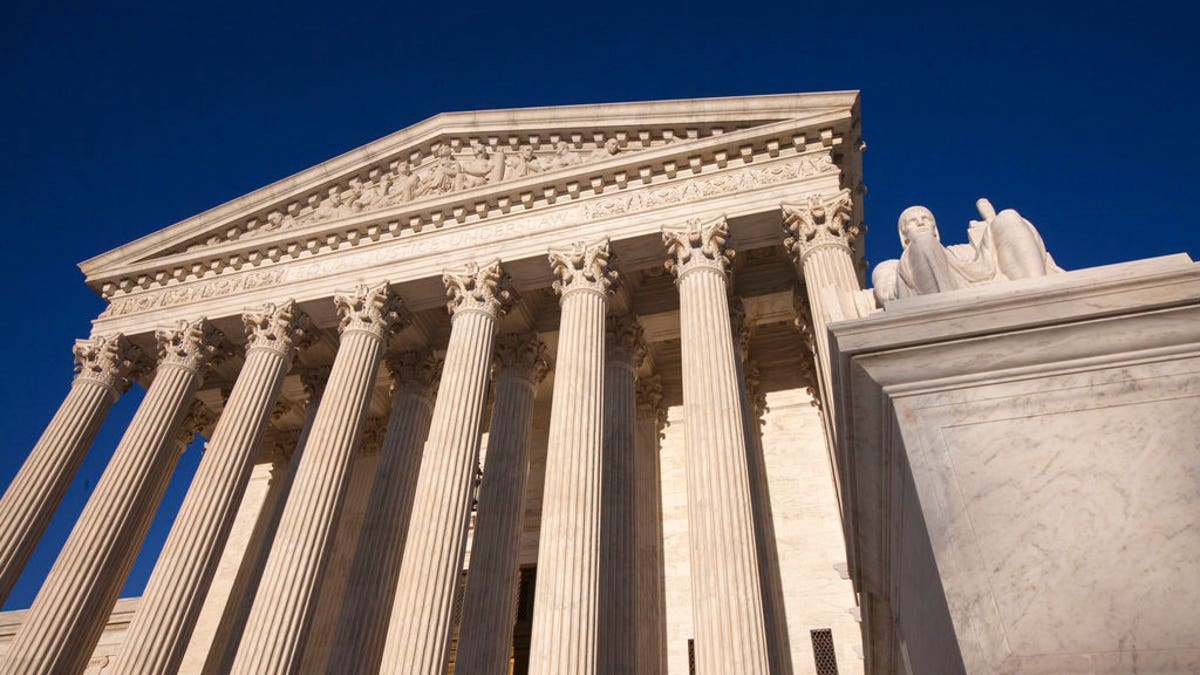
Oral arguments will be held this week at the Supreme Court on President Trump's so-called travel ban. (AP)
This term, Supreme Court watchers are paying close attention to “Masterpiece Cakeshop”—the gay wedding cake case--which could be a landmark in First Amendment jurisprudence.
But there’s another case, though getting less attention, that may be just as consequential. That case, technically about sports gambling, is “Christie v. NCAA.” The case will be renamed now that Phil Murphy has succeeded Chris Christie as governor of New Jersey.
At heart, the case is a dispute over the Tenth Amendment, a part of the Bill of Rights not as well known to average Americans as the First Amendment. That may be because, for most of the country’s legal history, it has not played a large role. But “Christie v. NCAA” could be a sign the Court’s attitude is changing.
The text of the amendment itself is short and simple: “The powers not delegated to the United States by the Constitution, nor prohibited by it to the States, are reserved to the States respectively, or to the people.” It was a reminder from the Founders to the newly-created federal government that its powers were limited.
But, as Fox News legal analyst Judge Andrew Napolitano puts it, the Tenth Amendment then “fell into a state of somnolence.” It was asleep for generations as the federal government’s reach and authority grew, while the courts allowed the expansion.
However, Napolitano notes, “the 10th amendment, though very much disfavored by progressives...has been revived somewhat” in recent years.
In particular he cites the 1995 case “United States v. Lopez” in which the Supreme Court declared Congress had no power to ban guns near schools because such a law didn’t relate to its constitutional power under the Commerce Clause to regulate interstate commerce—which meant Lopez had his case dismissed.
The Lopez case made it clear that Congress couldn’t do just anything it wanted, but the question since is how far can it go. The “Christie” case is testing that line.
It is specifically about sports gambling, though the ramifications are much larger. There are a lot of ins and outs as to how it got to the Supreme Court, but, in essence, here’s what happened:
In 1992, Congress passed the Professional and Amateur Sports Protection Act (PASPA), which made it illegal for most states to authorize betting on sports.
Years later, the state of New Jersey thought maybe it was time to legalize sports betting, even though it was too late under PASPA. In 2011, almost two-thirds of its citizens voted for an amendment to the state constitution allowing sports gambling, and in 2012 New Jersey passed a law legalizing it. The legislation was challenged in court by the National Collegiate Athletic Association as well as four pro sports leagues—the NBA, NFL, NHL and MLB.
The courts found New Jersey had violated PASPA. So the state went in a different direction, passing a 2014 law that repealed its existing bans on sports gambling. Once again they were brought to court, and that is the case now being decided.
The question now is whether the U.S. government has gone too far under the Tenth Amendment—is Congress merely pre-empting state law, which is its right, or is it commandeering it?
Under the Constitution, federal laws are supreme, so the U.S. Congress can pass legislation that supersedes state law. What it can’t do, according to the Supreme Court, is require specific, targeted duties from state officials, or control how a state governs itself.
In “Christie v. NCAA” New Jersey maintains that a federal statute that prevents it from modifying or repealing a state law commandeers the regulatory power of the state and thus violates the Tenth Amendment.
According to Judge Napolitano, under existing jurisprudence, “this is a no-brainer.” If the Court follows “the law as it has been written, they can decide this with one sentence, and New Jersey would lose.”
That has led to speculation the Supreme Court has taken the case because it’s ready to change, or at least extend, Tenth Amendment jurisprudence.
As Napolitano notes, “I don’t like to read tea leaves...[but] I would say there’s no reason for them to take this case unless they want to revivify the 10th Amendment a little bit more and push back on the Congress’s use of the Commerce Clause a little bit more.”
The distinction between what is pre-emption and what is commandeering may seem highly technical, but the implications are tremendous. If the Supreme Court decides in favor of New Jersey, it may open up a vein of activism from states that wish to shake off the yoke of federal regulation. At the very least, many states would legalize sports gambling to open up a new revenue stream. But it could go a lot further than that.
For instance, some legal experts suggest it could change how much say federal officials have on numerous contentious issues on which the feds and the states don’t see eye to eye, such as gun laws and marijuana legalization. Indeed, if the Court goes far enough, it could change the entire relation the states have with the federal government.
As Judge Napolitano puts it, “It would depend upon how broadly written the opinion is....At some point the Supreme Court is going to say [all this federal regulation is] crazy, this is nowhere contemplated under the Commerce Clause. So one of these days that might happen. I don’t know if this is going to be it.”
But if it is, the “Christie” case could be a legal revolution.
